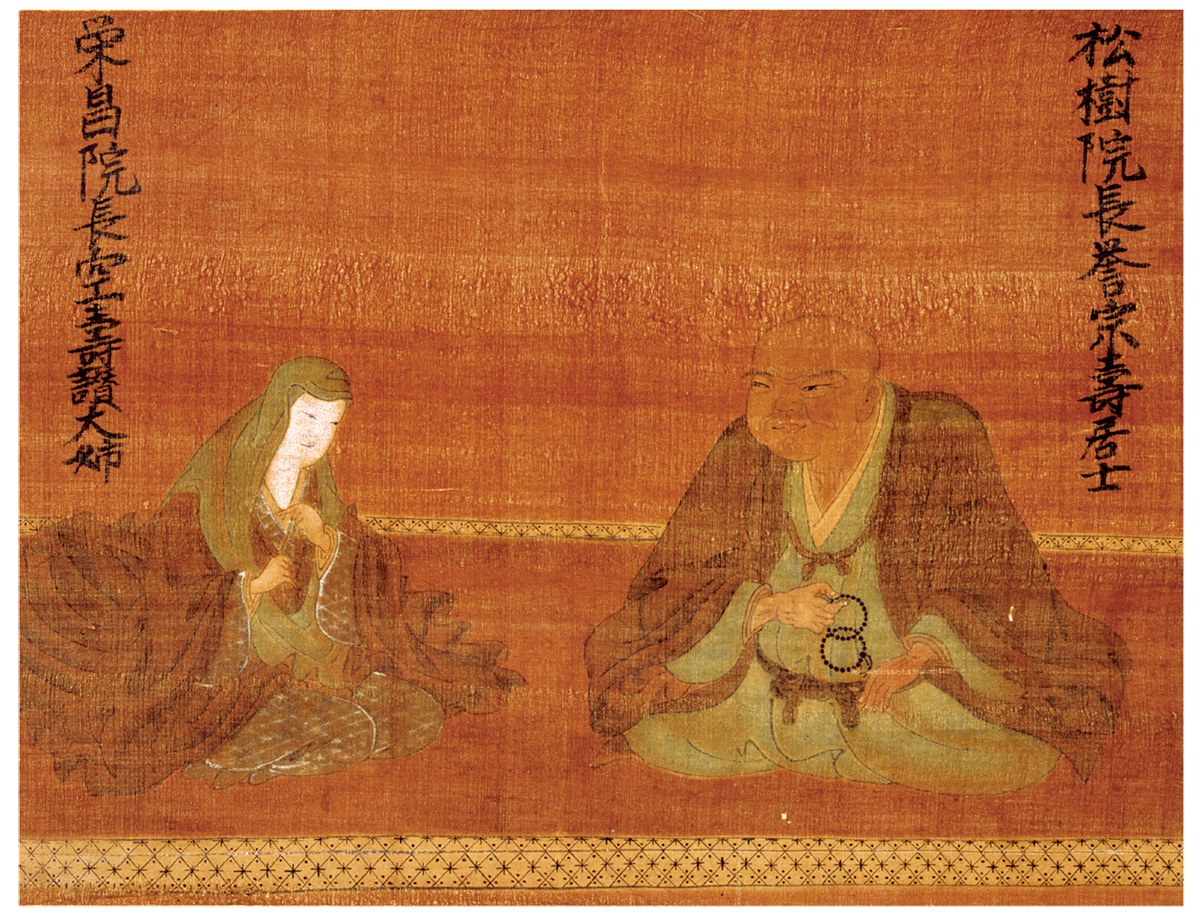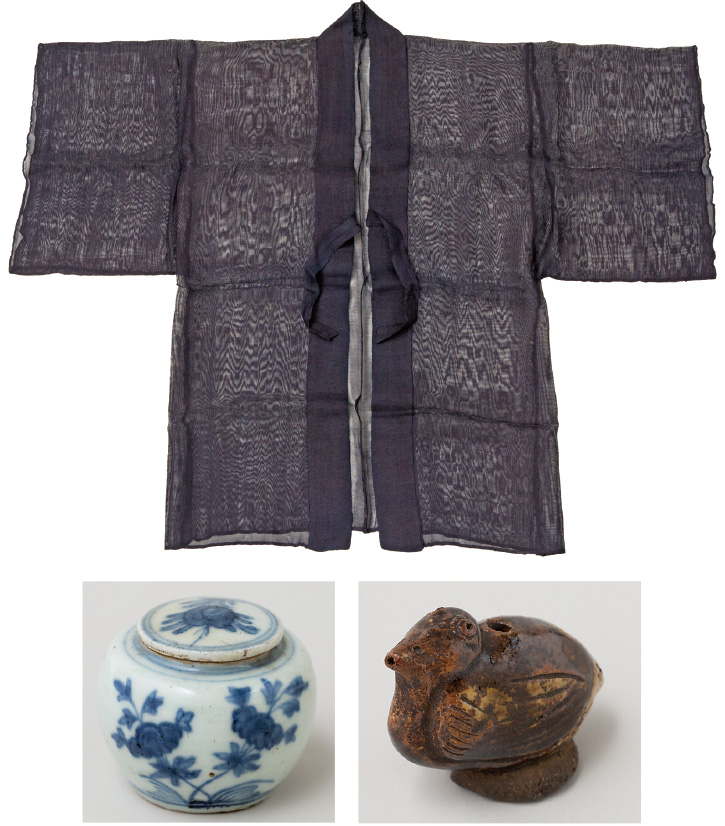01 Mitsui Takatoshi—The Founder of the Mitsui Family

Father of Merchants
Since the early modern period, Mitsui Takatoshi has been hailed as the founder of the Mitsui family. Takatoshi was born in 1622 in Matsusaka, Ise Province, and was the youngest of eight children. At age 14, he traveled to Edo (now Tokyo) for training and work experience. He temporarily returned to Matsusaka at age 28, but later went on to open his own stores in Edo and Kyoto at age 52. He possessed an innate talent for business that brought him an astonishing level of success, making him one of Japan’s best-known merchants from this period.
His children later wrote about his life and personality (→04, 06). Takatoshi was devoted to his work, saying he had no need for leisure pursuits outside of business and was also fond of learning about other people. In his youth, he reportedly appointed a man who cooked rice to a key position in one of his stores. He had a reputation for treating his employees well and was known for sharing specialty foods with his entire staff, regardless of the amount available. In Shobaiki (a record of Mitsui’s founding days) (→04), Takatoshi’s third son, Takaharu, wrote that popular perception viewed his father as “the founder of the Mitsui family as well as the mercantile class” and “a shining example of the four occupations [of Japan’s feudal era].” The renowned writer Ihara Saikaku came from a mercantile family and interviewed several merchants to write his bestseller The Eternal Storehouse of Japan. In it, he extols Takatoshi as “an exemplary successful merchant” and “a societal treasure.” In his later years, Takatoshi moved to Kyoto where he lived until his death in 1694.
Takatoshi’s forays into business began when he traveled to Edo at age 14 bearing bolts of cotton cloth worth 10 ryo (a pre-Meiji gold-based currency). By the time of his death, his estate was valued at 4,320 kan (strings of coins) of silver, or close to 72,000 ryo when calculated in gold (→Fig. 01b). This was the equivalent of nearly 6% of the Tokugawa shogunate’s total revenues that year, attesting to the massive amount of wealth Takatoshi had managed to accumulate in the course of a single lifetime.
His Wife and Children
Takatoshi’s wife Kane (known posthumously as Jusan) is considered a founder of the Mitsui family together with her husband. Kane came from the wealthy Nakagawa merchant family and was greatly admired for her frugality and deep compassion. She reportedly rose early to see employees off for morning departures and always made herself available to meet servants’ relatives when they visited, no matter their rank.
Takatoshi and Kane both lived long and healthy lives, having ten sons and five daughters together. Their sons in particular possessed extraordinary business acumen and helped their father expand his business and carry on its operations (→06).
Quotes by Takatoshi
The previously mentioned volume, Shobaiki, contains numerous quotes by Takatoshi. They express his knowledge about commerce and also draw on his own experiences as well as past and present anecdotes. His children and employees likely compiled the quotes after his death based on what they had heard him say. This section introduces a selection of Takatoshi’s quotes.
Gratitude for Peace“Civil unrest disrupts the transport of gold, silver and goods. The first step in building a house is to level the ground. We must never forget to be grateful to our leaders for preserving peace.”
Business Begins with Health“Even the Analects of Confucius preach the merits of taking care of oneself. Prayers should begin with requests for the health of our descendants and long life.”
Innovation“In business, you should innovate new ways of doing everything.”
Important Appointments“Even large organizations can operate smoothly if managers select their subordinates appropriately and in the right order. The head of the organization only needs to select the right managers.”
Imitators Lead to Profit“The more followers you have, the more famous you become and the more profit you can make.”
On Collecting Information about One’s Own Business“Employees should report and discuss the rumors they hear. For every ten rumors they report, one or two is likely to be useful. And they should give drinks to merchants who come to our shops and encourage them to gossip about the businesses they deal with. However, servants should refrain from drinking with our own vendors.”
The Dangers of Striking it Rich“Merchants that strike it rich through mining, rice cultivation or major public works contracts are quick to fall into ruin. Merchants who devote themselves to hard work are the ones who create long-lasting wealth for their descendants.”
Acting on Behalf of the Customer Leads to Long-Term Profits“You may be able to sell a product to a merchant at a very high price, but if they cannot sell it to their customers, they will stop ordering from you. That is a loss for both parties. Also, if a customer falls behind in their payments, you can create a loyal customer by doing everything you can to clear their debt.”
On Having a Strong Work Ethic“Abbots of Buddhist temples wake up early every day and start working. Feudal lords are not permitted to depart even one day behind schedule for their visits to Edo. Merchants who achieve success, but lose their work ethic, will lose their businesses as well.”
On Frugality“Considering how interest accumulates, even small amounts of money should not be spent needlessly. Employees too, can become wealthy. Saving money is more dependable than earning ten times as much.”
Approach to Pocket Money“Merchants who spend their pocket money without considering its impact on their accounts are in the lowest bracket, those who do consider its impact are in the middle. Merchants in the highest bracket do not consider the impact of how much pocket money they spend either, but this is because they habitually only use the amount of money they need, regardless of whether business is going well or not.”
Wives Take Care of the Hearth, Men Take Care of Business“Wives take care of their homes, and men work hard to earn money. A family’s rise or fall depends on the wife.”

This portrait of Takatoshi (Soju) and his wife Kane (Jusan) was likely painted near the end of his life during an illness. Takatoshi is holding Buddhist prayer beads in his hand. The painting’s composition reflects traditional portraiture conventions for married couples during Japan’s medieval period. Several copies of the couple’s portrait were created in later periods and presented to the couple’s descendants and employees who had made significant contributions. Many of these later copies remain extant but differ slightly from each other. The portrait shown here was painted on silk and preserved by the Kitake, a lineage of Takatoshi’s legitimate family, and is thought to be the basis for the other copies. The work presumably shows Takatoshi’s actual appearance when he was alive, before he was idealized as a symbol of merchants in later periods.

Takatoshi (Soju) made this will a few months before he died. It indicates which proportions of his vast wealth were to be assigned to each of his many children. His children signed their names under the amounts allotted to them. In fact, the children worked together to continue operating the business (→06).

A man’s jacket (jittoku; top), a porcelain jar with underglaze blue decoration (bottom left) and a water dropper for calligraphy (bottom right) are examples of possessions that were passed on to Takatoshi’s descendants or awarded to employees who made significant contributions.
